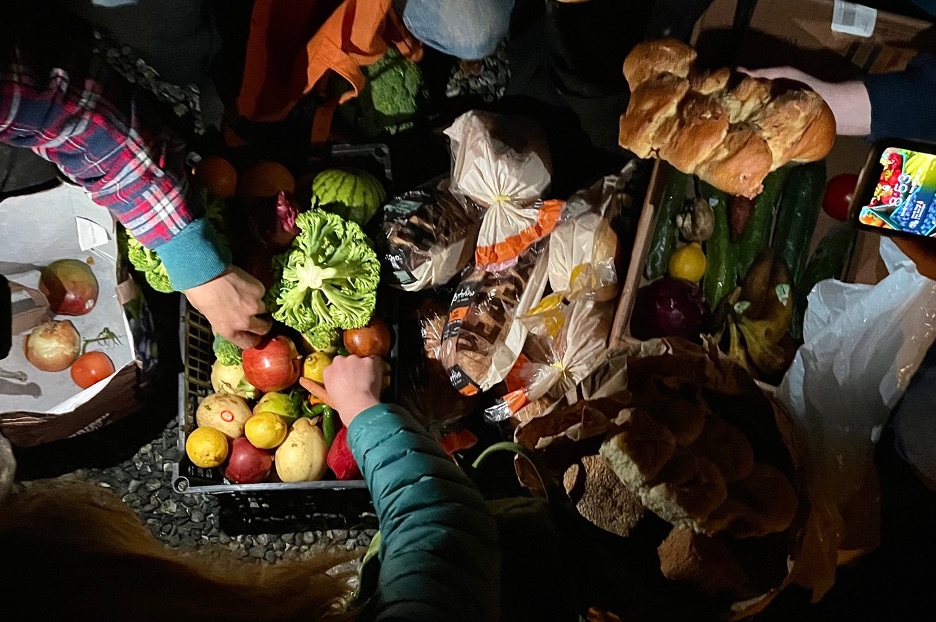The $10 price tag on a head of cabbage has some asking: “Why not get it for free?”

Hands reach in to share the spoils of a successful dumpster diving expedition with the Community Cabbage club. Photo by Scott Van Haren.
Rising food costs and environmental concerns are leading some students to dig deep into dumpsters, creating a community of urban scavengers trying to reduce Victoria’s food waste and their own budgets.
Recent surveys show that almost 65 per cent of UVic students face some level of food insecurity and almost 85 per cent of young people across the globe feel at least somewhat anxious about climate change. Dumpster diving allows students to make ends meet and reduce their carbon footprint at the same time. It’s no wonder that Community Cabbage, UVic’s unofficial dumpster diving club, is bouncing back after a two-year lull.
“It’s so thrilling when you find some food and you’re like, ‘I just saved so much money and I’m saving the planet. Everyone is winning,’” says Mari Nielsen, a UVic biology student who recently spent a month eating exclusively from dumpsters.
With inflation raising the cost of living, many are finding it hard to scrape by, and the ongoing rise in food prices makes buying groceries a huge financial stress for students.
“I can’t really afford groceries and rent here in Victoria these days,” says Maya Kostamo, an environmental studies student who began dumpster diving last year out of financial need and now leads Community Cabbage.
Through scavenging dumpsters, Kostamo has become “more and more aware of how much food waste there is,” and their motivation has shifted from economic to environmental.
An estimated 58 per cent of food produced in Canada goes to waste, according to Second Harvest, a national organization dedicated to reducing food waste. This uneaten food represents a significant environmental toll from the land and water used to produce it, as well as the carbon emissions from cultivation and transport, all for it to end up in the bin. Furthermore, when the uneaten food winds up in the landfill, it decomposes and releases greenhouse gasses.
In reclaiming groceries from the garbage, the aim of many dumpster divers is to avoid supporting the conventional food chain that leads to this waste.
Dumpster diving “reallocate[s] food that would have gone bad back into the community who is already struggling to access produce,” says Quincy Pike, a sociology and environmental studies student who recently began diving with Community Cabbage.
Pike joined the club because she was struggling to afford groceries or rent and was often visiting food banks to feed herself. She says she wanted a safe place to dumpster dive, and going with other students who were in the same position “took the shame away from it a little bit.”
For Kostamo, Community Cabbage is “just a group of people who dumpster dive once a week and then share it with [their] friends or other UVic students.”
Drawing a weekly crowd of 10 to 15 people, the group splits up into cars, each following a different route, tracing all the best dumpsters in different regions of the city. After an hour or so of gathering, the groups reconvene to pool their hauls and each member takes what they need.
Often, the club collects more food than members can use, and some must be put back in a dumpster. Despite this surplus of free food, Community Cabbage is conscious to avoid areas where people need the food even more than they do. The club skips over spots the unhoused community is known to rely on to ensure equal access to the frugal bounty of the dumpster.
All these scraps may seem like cheap eats, but there’s no such thing as a free lunch.
“You’re always taking a risk,” says Scott Travers, owner and operator of the Oak Bay location of Red Barn Market. He says that dumpsters often contain safety hazards, such as broken glass and expired meat. Some grocery store owners lock their dumpsters, trying to avoid the liability of someone getting hurt while diving.
Dumpster divers also face the risk of detection. While there are no laws in the area against dumpster diving itself, divers are often trespassing to gain access to dumpsters. These urban scavengers are always on the lookout for anyone who might shoo them away.
Perhaps what brings people back to the dumpster, despite the risks, is the comradery they share. “The cool thing about dumpster diving,” says Kostamo, “is how it creates community.”
All the divers interviewed for this story jumped into their first bin with a friend who dove previously.
Kostamo adds that they wouldn’t have started diving had it not been for their roommate and Community Cabbage encouraging them to “just jump in the dumpster and grab the food.”







